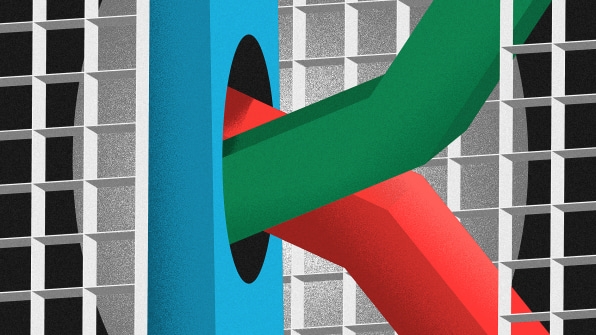Dd the 2020 economy end up being K-shaped?
Fast Company: What did the federal government do right?
Josh Bivens: It did a couple of things right. One, I think the Federal Reserve saw the economic shock coming and started to do lots of things to make sure the financial markets didn’t freeze up. [Those things were] not super-effective for helping typical families, but they signal to other policymakers: this is serious, you should start getting in gear as well. They did a good job in their role as “economic crisis watchdog,” and started barking early on.
The CARES Act had a lot of good in it. The really good, transformational part of it were the unemployment insurance (UI) changes, the $600 checks [the amount of federal assistance issued per week until July 31 for people already receiving unemployment benefits, in addition to any state benefits]. Basically, an attempt to make sure that no one who’d lost their job due to the pandemic saw an income cut at all. I think that was exactly the right thing to do.
And then, I think underrated, is the Pandemic Unemployment Assistance Program (PUA) [federal assistance in the amount of 40% to 50% of normal wages, issued to newly unemployed people including self-employed and contract workers], which really tried to patch a bunch of the holes in our traditional UI program. Gig workers and Uber drivers who don’t qualify for traditional UI. Parents who had to stop working because their kids’ school was shut down and there was no one left to care for them at home. These are all people who traditionally would have been left out of UI; the PUA program tried to sort of scoop them up. PUA also did a lot of the work that the checks were meant to do.
The PPP [Paycheck Protection Program, roughly $670 billion in “forgivable loans” funded under the Small Business Administration, which was mostly intended for small businesses to temporarily cover payroll and other expenses] was a lot of money. I think, in the end, we just did not have a federal government functioning well enough to actually make that program work. I think estimates are that it was kind of inefficient, in how much money was spent in terms of jobs saved. It’s one of those rare things—this failed even though it was well intentioned. Usually when our federal government fails, it’s because they don’t actually care, they’re not trying to help.
The cardinal sin of the CARES Act—even the good provisions—was that it was meant to deal with a three-to-four month economic shock. And the economic shock has obviously lasted a lot longer than that.

FC: Did the government only consider the financial economy, or also the real economy?
JB: In the very early stage, there was a concern about typical families and the real economy. That’s why you got the one round of checks. That’s why you got really generous UI. I do think, when the $600 [in extra unemployment insurance] ran out at the end of July and we’d already sent the check, lots of them took their eye off the ball and looked at things like the stock market, or forecast of third-quarter GDP growth, which were impressively high if you took it entirely out of context. And basically said: our job here is done. A recovery is well underway. Just like the CARES Act was too short, the attention on the economic plight of typical families was way too short as well.
FC: Did the election play into the economic strategy?
JB: I was a little surprised that the election in November didn’t provide more pressure on incumbents to do another round of relief. Someone made the decision at some point: it’s too late for us to get credit for it. I do think, right now, the Georgia special election is putting a lot of pressure on Congress to do something. I think Mitch McConnell actually wants to pass something. He knows people are voting and people are gonna blame incumbents. If there had not been a special election in January, I’m not sure there’d be as much momentum as there is today to do at least something.
FC: Was the economy as good as Trump claimed it to be, pre-COVID?
JB: I definitely think it was not. The one area that it was relatively strong was that we almost had enough aggregate demand in the economy to keep unemployment low, and that’s really important. I don’t think Trump had much to do with it. I think that’s mostly the Federal Reserve that admirably decided not to slam on the brakes as unemployment hit 5% below, which they normally do.
Productivity growth was abysmal throughout most of the recovery after the Great Recession. It was starting to pick up a tiny bit in 2019, but still really weak. On the issue of distribution and inequality: averages are nice, but you really want to know if average growth is translating into pretty solid growth across the board. On that front, it just really wasn’t, even with pretty tight labor markets. And, a lot of the Trump administration policies were actively sabotaging any progress on distribution. I like low unemployment, I think it’s a really important target, but it’s not the one single summary measure of how healthy the economy is.
FC: Did COVID reveal the realities of income inequality and a broken safety net?
JB: Absolutely. Inequality has meant a really large portion of U.S. families just don’t have anything like their own private savings buffer to get through shocks—but low-wage workers really don’t have it. [The] disinvestment in our safety net over the past decades showed up: even when we tried to do the right thing on UI, people had to wait weeks and weeks for their checks to come.
I think an underappreciated part that actually intersects with the public health response in a real way is the fact that American workers are just so disempowered on the job. Forget belonging to a union, but just even having anything like strong OSHA protections [standards set by the Occupational Safety and Health Administration to eliminate workplace hazards; strict requirements for COVID did not happen on a nationwide scale]. I think that really hurt them, and made the virus transmit much more. We just do nothing to provide workers even minimal health and safety standards on the job. It just revealed decades of disinvestment and disempowering workers.
FC: Is this now a K-shaped recovery (whereby the divide between the financial economy and the real economy, and wealthier and poorer workers, continues to grow)?
JB: Definitely. One of the really characteristic features of this recession, relative to previous ones, is how much it’s been focused on low-wage sectors. Traditionally, recessions start in manufacturing and construction, and then low-wage workers get hit in the ripple effects. This time, the ground zero was low-wage, face-to-face service sectors. They took the biggest blow initially, and those are the places that have been slowest to have anything like a full reopening. As bad as the GDP decline has been, I think even that really understates just how much human suffering this one is inflicting.
FC: There were so many problems with unemployment systems across states that delayed or even prevented people from getting their checks. How should that be fixed?
JB: I definitely think, going forward, the federal government should take on that responsibility. We have disinvested in UI systems, specifically, for so long. When this wave of people hit the system, we just got completely overwhelmed. Part of the reason why we did the extra $600 is that state UI systems couldn’t handle anything more complicated. So, a simple rule that you just get 100% of your pre-job loss of income in the form of UI—they couldn’t handle that calculation. It was too hard for them. The only thing they can handle is a flat [rate]. We don’t have any UI systems where you can flexibly change, depending on the state of the business cycle, how much people get back in terms of income replacement. That’d be a great thing to have. It’s got to be the federal government. We’ve tried states running it: it doesn’t work very well, they don’t invest enough.
FC: What else do you hope happens in 2021, with a new administration in power?
JB: I absolutely hope that high on their list is making sure we have a substantial enough UI system throughout most of the rest of the year. I think the first quarter of next year is going to be brutal. So, I think we’re just going to need another big tranche of relief and recovery. Besides the UI, the really obvious thing is state and local aid. We saw what happened following the Great Recession, when state and local governments had their aid cut off and just had to cut back their spending, [and] there was a huge drag on growth.
And then, getting on the long-run effort of building back up things like our safety net. And something to help workers actually get some more leverage and bargaining power on the job. The basic stuff, but also wages, because I think that decades of inequality leading up to this left so many people vulnerable.
FC: Is it time to dust off old economic notions, and consider new ideas (such as universal basic income, or modern monetary theory)?
JB: I definitely think so. [Pre-COVID,] We had a pretty large budget deficit, driven at least in part by the big tax cut that Trump did, and yet interest rates were really low. The old-school thinking, that whenever the economy was remotely healthy, you had to focus on reducing the deficit or bad things would happen—that seemed to not be justified by what was happening. So, I think we need a rethink of a bunch of things, and we should think boldly. The economy just hasn’t really delivered the goods in a broad way for a long time. Now is the time for big rethinking.
(61)



